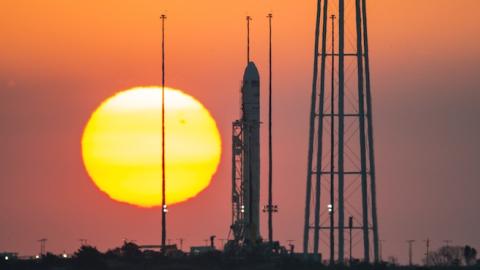It hasn't been a good week for America’s reputation as a leader in space.
First there was the spectacular explosion of Orbital Sciences’s Antares rocket last Thursday. Then came the crash of Virgin Galactic’s rocket plane on Saturday, a major setback for hopes of commercial space travel at a time when NASA has all but handed over the field to the private sector.
Indeed, coming on the heels of President Obama’s termination of the space shuttle program in 2011, both events had people wondering if the end of America’s decades-old dominance of space flight is really finally here.
What the pessimists missed, however, was the successful launch last Friday of United Launch Alliance’s Atlas V booster, carrying a GPS satellite into orbit — the fiftieth such successful launch — and powered by the same kind of seventies-era RD-180 engine that blew up on the Orbital Science platform.
All of which proves we’re far from down and out in the space race, and that even old technologies work when we’re committed to their success.
It’s true that, unlike the era of John Glenn and Neil Armstrong, the new age of space offers plenty of room for commercial ventures, whether it’s by Elon Musk’s SpaceX or Richard Branson’s Virgin Galactic, and whether the aim is to launch satellites or to send tourists into space. The days when only a government agency could operate these advanced technologies safely or frequently are long gone.
But commercial companies, no matter how skilled or innovative, can’t conquer space alone. It may be hard for some conservatives to admit, but there are still things government does best, because it can muster more critical resources — technological, scientific, and monetary — than the market can readily supply.
Defense is one such area; space is another. And the two are closely related.
Many defense technologies — satellites, rockets and ballistic missiles, sophisticated guidance systems and delivery vehicles as well as remote computer command and control — overlap with space technologies (it’s not for nothing that the government agency overseeing the ULA launch is the Air Force). Indeed, many defense technologies grew out of the space program itself.
Space isn’t only a scientific but a strategic domain, and securing our country’s future in it has to be a pressing national priority.
Today our leading rivals understand this, even if the current administration doesn’t.
China’s plans for its own orbiting space station in 2016 and a manned moon landing by 2025 are driven as much by a desire for strategic, even military leverage as by a thirst for science. Likewise, Russia understands that the path to regaining its superpower status points into space, which is why it continues to pour money into space ventures even as the rest of its economy stagnates.
Meanwhile, thanks to Obama, we have to rely on the Russians just to get our people to the ISS.
Indeed, he not only junked the Space Shuttle, he also cut NASA’s planetary sciences budget by one-fifth, and pulled funding from the proposed Constellation program for returning to the moon. More notoriously, he expanded NASA’s priorities to include Muslim outreach and monitoring “climate change.”
NASA used to be an international symbol of American strength and know-how. Instead, Obama has turned it into a national joke — and after Thursday’s rocket failure, a national embarrassment.
Fortunately United Launch Alliance’s successful lift-off on Friday proves we can restore pride in American efforts in space, especially if a new Republican Congress and a new president will step up and re-commit NASA to the path JFK blazed, more than fifty years ago.
It’s time to show the world that America’s leadership in this vital area of science and national security hasn’t crashed and burned.















